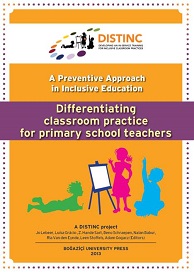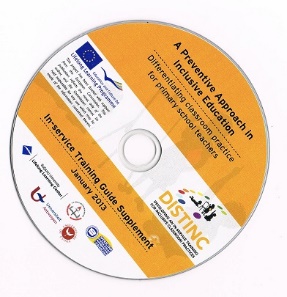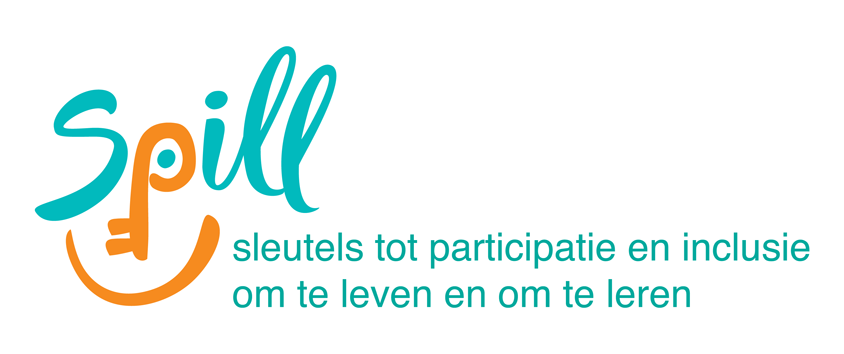 The DISTINC project ( Developing In-service Training for Inclusive Classroom Practices) ran from 2010-2013 within the EU Comenius Programme, led by the Bogagici University of Istanbul. Together with six partners from five countries (Turkey, Poland, Belgium, Portugal and the United Kingdom), we have developed an in-service program for primary school teachers to improve their skills and knowledge about inclusive classroom practices, especially for children who encounter learning and participation barriers. The teacher guide with DVD is available in English, Dutch, Turkish, Polish and Portuguese.
The DISTINC project ( Developing In-service Training for Inclusive Classroom Practices) ran from 2010-2013 within the EU Comenius Programme, led by the Bogagici University of Istanbul. Together with six partners from five countries (Turkey, Poland, Belgium, Portugal and the United Kingdom), we have developed an in-service program for primary school teachers to improve their skills and knowledge about inclusive classroom practices, especially for children who encounter learning and participation barriers. The teacher guide with DVD is available in English, Dutch, Turkish, Polish and Portuguese.
Project results
Teachers’ Guide
 | Lebeer,J., Grácio, M.L., Sart, Z.H., Schraepen, B., Babür,N., Van den Eynde, R., Stoffels,L., & Gogacz, A. (2013), A preventive approach in inclusive education. Differentiating classroom practice for primary school teachers. Teachers’ guide. Istanbul: Bogagici University Press. 225 p This A4 book is intended for teacher trainers. In addition to suggestions for general in-class and in-school differentiation, it also pays special attention to the process of initial learning to read, reading comprehension, and managing challenging or difficult to understand behavior. The ultimate goal is to increase learning opportunities for all children, especially children with learning difficulties and / or challenging behavior, to develop their school, social, emotional and physical potential, together with their classmates. This manual is available in English, Dutch, Turkish, Polish and Portuguese. It consists of short theoretical background texts and a collection of “work sets” or “toolboxes”, with a brief description of a selection of evidence-based strategies and methods. The accompanying DVD contains numerous presentations and more texts. Both the manual and the content of the DVD are now only available online. Download here the Teachers’ Guide in English – Polska – Turkish – Portugues |
| Contents | Module 1 Inclusion in education, basic concepts – Module 2 Inclusive classroom practices – Module 3 Challenging behaviour: what do we know? What can we learn? – Module 4 Prevention and guidance of difficulties in early literacy and initial reading – Module 5 Reading comprehension |
 | Toolbox 1 General characteristics of inclusive education : 15 presentations (only in English): Right to Education – Reasonable accommodation – Right to Education Children with Disab – GoldenRules – Contextualizing – Inclusive paradigm – Brain & Learning –Labeling – Index for Inclusion – Stigma – Beyond Labeling – How avoiding grade retention – Inclusion dilemma’s – Broader School |
 | Toolbox 2 Inclusive classroom practices (only in English): Removing barriers – All smart brainstorm – Japanese hat – Multiple Intelligences – Learning Styles – Differentiating materials according cognitive map – Mediation in inclusion – structured Lesson Planning – Sticordi measures – Peer mediation1 – Peer Mediation2 – Co-teaching – Bruner |
 | Toolbox 3 My behaviour, your behaviour – Patterns – Understanding challenging behaviour – Probable causes – Teachers’ roles – Perspectives – positive classrooms – positive peer relations – positive teacher-student relationships – good routines – respond to rule violation – cognitive-behavioural intervention with Feuerstein-Basic – tips & tricks – carroussel of challenging behaviours |
 | Toolbox 4 Reading theory – Overcoming difficulties in early reading and fluency – PASS-based reading enhancing programme – School-wide reading enhancement Toolbox 5 Reading strategies for reading comprehension |
Objectives
- Mapping the specific current needs, knowledge, skills, attitudes and perceptions of primary school teachers dealing with a range of children with different needs, including children with special educational needs
- Raise teachers’ awareness and improve their ability to deal effectively with a range of children with special educational needs in their class, especially children with special behavioral problems, learning difficulties, in particular. reading weakness.
- Help teachers gain an understanding of what inclusive education really is so that they put it into practice and improve their capacity to act
- The ultimate goal is to improve the academic, social and self-regulatory skills of children at risk of school failure, due to learning difficulties or behavioral problems, so that they are less likely to be dropped out or referred to special education.
- Promote European cooperation and mutual understanding, in teacher education, regarding training in inclusive education through exchange of experiences
To achieve this, a number of in-service training modules were developed, which were initially offered to 25 teachers, who in turn would further train their colleagues in this.Then the modules were offered to a wider circle
Why something like the Distinc Project?
In recent decades, there has been a global movement towards inclusive education. Its aim is to give equal educational opportunities to all children, to develop their educational, emotional, social and physical potential. Many countries have amended their laws to make education more inclusive for children with learning or behavioral difficulties. Practice is lagging far behind policy intentions. Teachers struggle to deal with sometimes widely differing diversity of needs and performance levels. A large group of children who experience “barriers to learning” have an “invisible” disability: they have (sometimes unrecognized) learning disabilities, behavioral difficulties, or difficulties with attention and concentration. They drop out of the educational boat or have substandard learning achievements. A large group comes from unfavorable socio-economic situations. They often receive little or no support. Teachers have insufficient training and skills to deal with this adequately. For this reason, many of these children benefit too little from the normal educational offer. Consequently, it is crucial that teachers are (re)trained in the most effective methods and strategies for inclusive teaching practices
Partners
| TR |  | BULLC – Boğaziçi University Lifelong Learning Centre www.buyem.boun.edu.tr is a part of Boğaziçi University (www.boun.deu.tr), the biggest public university of Turkey |
| TR |  | IL MEM – Ministry of Education of the Province of Istanbul. http://istanbul.meb.gov.tr. It is the biggest administration of Turkish Authorities . It has 2600 schools, of which 1800 primary school |
| PL |  | SWSPIZ –Management Academy, Łodz www.swspiz.pl |
| BE | University of Antwerp, Project Learning enhancement and Inclusion, Faculty of Medicine & Health Sciences | |
| BE |   | For the DISTINC , the University of Antwerp created a consortium with the INCENA Project (Inclusion & Enablement) of the AP University College , the Department of Teacher Training of the Karel De Grote University College and of the AP University College and the Bachelor-after-bachelor Special Educational Needs of the Artevelde University College, Ghent |
| UK |  | NPPS – Noel Park Primary School http://www.noelparkprimary.net (partner until june2012): a primary school with 565 pupils aged 3 to 11 years. The children come from 42 language and religious groups, in a district with great socio-economic deprivation. The school was honoured for setting up a system of Care, Guidance & Community Cohesion. It registered more than 190 children with disabilities (SEN special educational needs), ranging from learning disabilities, dyslexia, language and social communication problems, emotional & behavioral problems, autism and ADHD. However, Cameron’s government turned these and other similar schools into “academies” so that they would be dropped from the PISA statistics in order to polish UK school results. |
| PT |  | University of Evora, Research Centre of Education & Psychology (CIEP). The University of Évora, organizes educational training for all types and degrees, as well as for educational psychologists, for all of Portugal. It has partnerships with Brazil, Angola, Cape Verde Islands & Mozambique. It has a strong tradition in teacher education, in-service training and masters in educational sciences and psychology. Psychopedagogical evaluation and evaluation of special educational needs, in a socio-cognitive perspective, is one of the main research areas. The CIEP-UE is also associated with international initiatives such as the IRIS-, TISSNTE & Daffodil Comenius Projects |
Disclaimer
 | This project received financial support from the European Commission from 2010-2013 within the Lifelong Learning Programme. Contract no. 510072-LLP-1-2010-1-TR-COMENIUS-CMP. The contents of this publication are the sole responsibility of the editors and publishers and the European Commission cannot be held responsible for any use whatsoever of the information contained herein |
